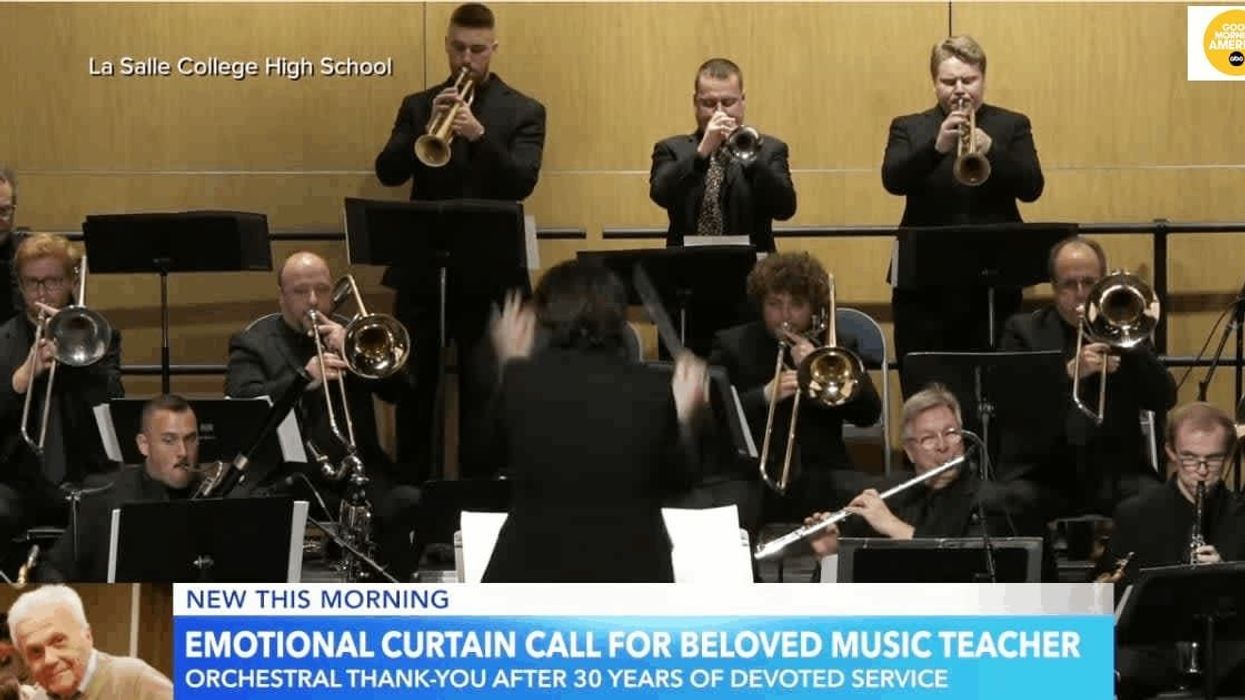This Philadelphia teacher received a surprise send-off from his students when he retired after teaching music for more than five decades. The beloved teacher Joe Ciccimaro was affectionately referred to as Mr. C by his students. Mr. C directed the performing arts program at the all-boys La Salle College High School for 54 years as per Inside Edition. When the 83-year-old decided that it was time for him to retire, more than 300 of his students came together to be conducted by him for one final time. His former students gathered in the school auditorium to send him off. Among his students was Hugh Panaro, from his class of 1982. Panaro played the title role in "Phantom of the Opera" on Broadway. This goes to show that teachers play such a huge role in creating true masters and work tirelessly towards helping their students achieve big things in life.
After 53 years and a countless number of students impacted by his commitment to the fine arts, Mr. Joe Ciccimaro '57 has taught his last lesson at La Salle College High School.
Thanks to Mr. C for his lifelong dedication to his alma mater - the longest tenured faculty member in… pic.twitter.com/2AGksqdZIM
— La Salle College High School (@lschs) May 10, 2023
People drew several parallels with Mr. C, including GMA comparing his story to that of the movie Mr. Holland's Opus. In the movie, Mr. Holland takes up a job as a music teacher to get a steady paycheck but then he gets little time for his own musical dreams. Be it in movies or real life, teachers make a huge sacrifice to make hundreds, even thousands of dreams come true. “When we walked into his band room, it didn't matter if you were a star on the football field, a star on the basketball court, we walked in, picked up our instruments, sat down at the piano, and we were all one,” Frank Dilella one of Mr. C's former student told Inside Edition. The students planned the surprise overnight to honor Mr. C's work. As per the X post from the school, Ciccimaro is the longest-serving faculty in the history of the school.
The post also wrote about the performance organized by the students saying, "Enjoy a look at his last class - a rendition of Bald Mountain, the last song he conducted at our 2023 Spring Band Concert - and the band playing him out this afternoon with the 'Alma Mater' on his last day." The teacher has created a legacy at the college where he has been teaching since 1968. Mr. C told GMA, "I have to be honest with you. I have never worked a day in my life, that's why I stayed here until I was 83." Mr. C was a musician himself, making him understanding towards kids with artistic talent. Panaro shared that being artistically inclined doesn't earn any extra points in high school, he was bullied, and the only compassionate person was Mr.C, making his success at Broadway possible. Everyone from Mr. C's kids, grandkids, and his students came together for his grand send-off, a testimony to the impact he has made on the lives of people around him.
The performance had a 30-piece plus orchestra and singers coming in from all over the country. Diella said that it was the ultimate thank you and a pitch-perfect homage. The performance was a reflection of what the teacher has done for his community and it was nothing short of iconic. The teacher added that he absolutely loved doing his job and retirement for him would be golf, lots of time with his family, and happy hours that could start before or after 5 post-retirement, he hilariously added.



















 Amoxicillin is a commonly prescribed broad-spectrum antibiotic.
Amoxicillin is a commonly prescribed broad-spectrum antibiotic.  Chart: The Conversation, CC-BY-ND
Chart: The Conversation, CC-BY-ND
 Counterintuitively, social media can make you feel more bored and lonely.
Counterintuitively, social media can make you feel more bored and lonely. Talking about what you’ve read can add a social dimension to what can be a solitary activity.
Talking about what you’ve read can add a social dimension to what can be a solitary activity. 
 Women and people of color who experience cardiac arrest are less likely to receive CPR.
Women and people of color who experience cardiac arrest are less likely to receive CPR.

 Mushrooms containing psilocybin.Photo credit:
Mushrooms containing psilocybin.Photo credit:  Woman undergoing cancer treatments looks out the window.Photo credit:
Woman undergoing cancer treatments looks out the window.Photo credit:  Friend and patient on a walk.Photo credit:
Friend and patient on a walk.Photo credit: 
